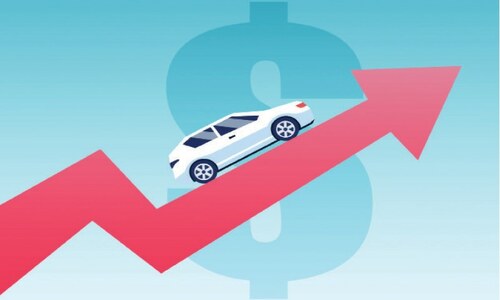Pakistan finds itself at a pivotal moment regarding the future direction of its domestic automobile industry. High protection on imported vehicles — currently over 45 per cent quantified by the Pakistan Institute of Development Economics (Pide) — has sheltered homegrown automakers from foreign rivals for decades.
This protective environment allows the domestic industry to dominate market share while investing minimally in new models or technologies. However, such insulation from competition also stifles innovation. Pakistan’s carmakers have grown accustomed to focusing on domestic sales rather than developing quality and capabilities to export globally.
With the economy now confronting severe headwinds, Pakistan aims to catalyse export growth as a priority. One ambitious proposal under debate is levying a special “super tax” on car company profits tied to export performance. Firms selling predominantly in the local market may face a 60pc super tax on profits. But the rate would drop to 15pc if 10pc of production is exported, or be eliminated entirely if exports exceed 40pc.
The estimated size of the car industry is around Rs2.9 trillion. The super tax gives car manufacturers a strong incentive to boost their production by up to 40pc in the long run. In this scenario, it may add an additional Rs1.2tr to the existing exports of about Rs7tr in FY23, given that the exchange rate against the US dollar is around Rs300.
Firms selling predominantly in the local market could face a 60pc super tax on profits, but the rate would drop if the company increased exports
Proponents argue this super tax would strongly incentivise Pakistan’s auto industry to enhance competitiveness, integrate into global supply chains, and play a bigger role in exporting abroad. This could help offset the nation’s chronic trade deficit, which keeps widening. With the motivation to sell overseas, Pakistani car companies would be compelled to improve quality to international standards.
However, critics argue that such an abrupt 60pc tax hike could unduly burden firms already struggling with high expenses and taxes. They point out that with limited production capacity, companies lack the ability to shift significant output toward export markets immediately.
Yet, the exorbitant premiums charged domestically for instant delivery of new cars — known locally as “on money” — indicate unmet local demand. This on-money fee, added by dealers, can inflate a car’s cost by over 13pc — and is projected to rise further.
On balance, the super tax proposal holds promise if implemented judiciously. Phased over three to five years, firms can methodically invest in capabilities needed to export competitively, like production, marketing, and distribution networks.
The tax could be tied to more than mere export volume. It could also reflect product quality and technology content. This would motivate exports of higher-value vehicles with modern features rather than flooding markets with outdated low-tech models.
For example, our domestic fleet of cars is far more fossil fuel-intensive than those of other countries. Despite hybrids and electric vehicles (EV) increasing in proportion elsewhere, they are still not available in Pakistan. Our fuel import bill is therefore excessive. If these companies could be persuaded to assemble/import hybrids and EVs, our import bill could be significantly reduced.
Certainly, transitioning Pakistan’s long-protected auto sector into becoming export-driven will require adjustment. With gradual implementation, the proposed super tax on carmakers can potentially transform Pakistan’s auto industry.
While the deep end of unfettered global competition is daunting, continuing the status quo of protectionism is unsustainable. With smart policies, Pakistan’s car companies can embark on a phased transition toward greater dynamism and success in world markets.
The super tax debate is an opportunity to creatively assist this industry in realising its full potential. The shock of an abrupt tax hike would certainly sink many firms. But with prudent design, realistic expectations and timescales, this reform can set Pakistan’s auto sector on the road toward exporting higher-value vehicles and integrating into global supply chains.
The coming years will challenge Pakistan to make tough choices for economic revival. While the auto sector super tax requires meticulous execution, the destination is worth the difficult journey.
With political will and close public-private coordination, Pakistan can place its car industry on a sustainable path — neither shielding incumbents nor leaving them stranded but enabling homegrown automakers to compete globally. The road ahead remains long, but with skilful navigation, Pakistan’s economy can shift gears to reach its destinations faster.
Dr Nadeem ul Haque is the Vice-Chancellor, and Dr Muhammad Zeshan is a Research Fellow at Pide
Published in Dawn, The Business and Finance Weekly, February 5th, 2024














































Dear visitor, the comments section is undergoing an overhaul and will return soon.